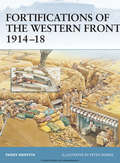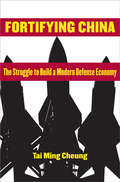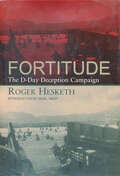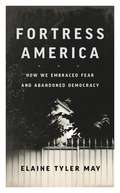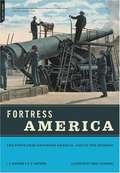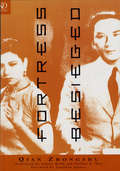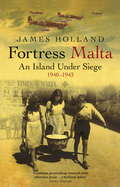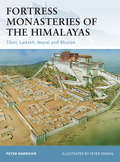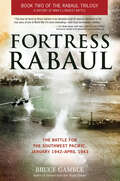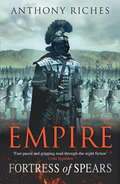- Table View
- List View
Fortifications in Wessex c. 800-1066
by Ryan LavelleThe defence of the 9th-century kingdom of Wessex under King Alfred against the 'Great Viking Army' is one of the major military achievements of Early Medieval history. While the guerrilla warfare in the Somerset marshes and the battle of Edington are characteristic of Alfred's military abilities, his definitive physical achievement was a series of some 30 well-structured fortifications (known as burhs) across the kingdom. Many of these fortifications survive to this day and some were even reinforced to stand up to German tanks in the expected invasion of 1940. This title describes their beginnings in the turbulent early years of Alfred’s reign as well as their subsequent development and use.
Fortifications of the Incas
by Adam Hook H. W. KaufmannThe greatest period of Inca expansion occurred during the reigns of Pachacuti (1438-71), Tupa Inca (1471-93), and Huayna Capac (1493-1527). From the mountain stronghold of Cuzco, they subjugated the surrounding kingdoms and territories, absorbing their civilizations and their peoples. By 1525, they dominated much of the west of the continent, relying on fortified strongholds, an extensive system of roads an bridges, and obligatory military service to control local populations. This title takes a detailed look at the development of Incan fortification techniques, and examines how they came to be overrun by the Spanish conquistadors.
Fortifications of the Western Front 1914-18
by Peter Dennis Paddy GriffithFollowing the early battles of 1914 along the Marne and in the Ypres salient, World War I rapidly changed from a war of movement into one of attrition, with the opposing sides entrenching themselves in a line of fortified positions from the Flanders coastline to the Swiss border. This volume details the different styles of fortification used on the Western Front throughout the course of the war, from the early ditches of 1914 to the complicated systems of 1918. It explains the development of the 'defence in depth' German system and the British reaction to it, as well as illustrating the importance of the pre-war forts, particularly around Verdun.
Fortifying China: The Struggle to Build a Modern Defense Economy
by Tai Ming CheungFortifying China explores the titanic struggle to turn China into an aspiring world-class military technological power. The defense economy is leveraging the country's vibrant civilian economy and gaining access to foreign sources of technology and know-how. Drawing on extensive Chinese-language sources, Tai Ming Cheung explains that this transformation has two key dimensions. The defense economy is being reengineered to break down bureaucratic barriers and reduce the role of the state, fostering a more competitive and entrepreneurial culture to facilitate the rapid diffusion and absorption of technology and knowledge. At the same time, the civilian and defense economies are being integrated to form a dual-use technological and industrial base.In Cheung's view, the Chinese authorities believe this strategy will play a key role in supporting long-term defense modernization. For China's neighbors and the United States, understanding China's technological, industrial, and military capabilities is critical to the formulation of economic and security policies. Fortifying China provides crucial insight into the impact of China's dual-use technology strategy. Cheung's "systems of innovation" framework considers the structure, dynamics, and performance of the defense economy from a systems-level perspective.
Fortitude: The D-Day Deception Campaign
by Roger HeskethThis declassified WWII report offers a detailed look at the Allied campaign to deceive the Nazis about the immanent attack on Normandy.As the conflict in Europe wore on, the Germans braced for an amphibious assault on France. The only question was where and when the Allies would strike. This required an intricate misinformation campaign to throw the Nazis off the scent. The objective of Operation Fortitude was to persuade the enemy that the long-awaited landings would take place in the Pas-de-Calais, and that any attack in Normandy would be nothing more than a diversionary feint that could be safely ignored. Hundreds of bogus agent reports were manufactured, an entire US Army Group was invented, false radio signals transmitted, and inflatable tanks, dummy bombers built of balsa wood and canvas landing craft were positioned where they could be photographed by the Luftwaffe. The elaborate ruse suggested an imminent amphibious assault from Dover, across the shortest stretch of the English Channel. Operation Fortitude was an extraordinary success. In this volume, the classified official history of the entire operation, written by Roger Hesketh as head of the team of D-Day deception specialists, has been declassified and released.
Fortnight of Infamy
by John BurtonWhile America was preoccupied with the aftermath of Pearl Harbor, an even greater tragedy was unfolding across Southeast Asia. From Wake Island to Burma, the Empire of Japan opened the largest front in the history of warfare: an aircraft-driven invasion of colonial possessions throughout the Far East that crumbled the entire Western imperial legacy of the nineteenth-century. Events during the first two weeks of battle set the stage for the greatest military defeats America and Great Britain would suffer during any conflict.This book offers the first comprehensive overview of the collapse of Allied air forces during the period between December 8 and 24, 1941. Written for a wide audience, it gives readers both a cockpit view of the desperate actions that took place and an understanding of why such heavy losses occurred. The narrative account includes enough detail and analysis to hold the interest of serious students of Pacific War aviation and enough exciting descriptions of air combat to attract those with little knowledge of the subject.Explaining how and why the Japanese were able to win a quick victory, John Burton points to U.S. failures in the concepts for employment of airpower and a significant underestimation of Japanese "air-mindedness" and aviation capabilities, failures that resulted in the loss or surrender of more than 200,000 troops at Bataan and Singapore.
Fortress America
by Matthew BrzezinskiHeavily armed guards at the entrances to malls and restaurants. Citizens deemed "suspicious" taken away without formal charges or legal counsel. Would a "safe" America even look like America anymore? One of the few journalists to penetrate the new counter terror initiative, Matthew Brzezinski offers an insider's look at the new technology, laws, tactics, and persistent vulnerabilities of the post-9/11 era. The result is this startling, sometimes controversial look at what it will take to achieve genuine homeland security and what it may be like to live inside Fortress America Is this what a safe America will look like? * Cameras at airport ticket counters that can tell if you are stressed * Satellites and surveillance equipment that can see through the walls of your home * Computer programs capable of spotting abnormal behavior * National ID "smart" cards encoding your personal, financial, and medical information required for electronic police spot checks In the aftermath of September 11, a massive effort has been launched to protect us from another terrorist attack. But the costs of safeguarding our country will require not only unprecedented amounts of funding, but dramatic changes in the way Americans lead their everyday lives. Is this the new price of freedom? * Mandatory chips installed in all cell phones and automobiles that can locate you instantly within a dozen yards * Patriot II legislation that can arbitrarily revoke citizenship and allow terrorist sympathizers to vanish without a trace * Transponder implants that could be injected into the bodies of prisoners, foreign nationals, and perhaps one day all US citizens... Such high-tech measures are not the stuff of science fiction but in many cases are already being implemented. As Brzezinski discovers, similar measures have been in use for years in security states like Israel. But will Americans trade liberty for security? Will they have a choice? And can even the most radical measures insure that a 9/11 style attack won't happen again? From an unheeded warning six years before the WTC disaster to dramatic war-game scenarios secretly conducted at Andrews Air Force Base and chilling on-site simulations of actual attacks, Fortress America paints a sobering picture of the future of freedom...and what life may be like in a maximum security state. From the Hardcover edition.
Fortress America: How We Embraced Fear and Abandoned Democracy
by Elaine Tyler MayAn award-winning historian untangles the roots of America's culture of fear, and argues that it imperils our democracyFor the last sixty years, fear has seeped into every area of American life: Americans own more guns than citizens of any other country, sequester themselves in gated communities, and retreat from public spaces. And yet, crime rates have plummeted, making life in America safer than ever. Why, then, are Americans so afraid-and where does this fear lead to?In this remarkable work of social history, Elaine Tyler May demonstrates how our obsession with security has made citizens fear each other and distrust the government, making America less safe and less democratic. Fortress America charts the rise of a muscular national culture, undercutting the common good. Instead of a thriving democracy of engaged citizens, we have become a paranoid, bunkered, militarized, and divided vigilante nation.
Fortress America: The American Military and the Consequences of Peace
by William GreiderThe economic consequences of a large peace-time military.
Fortress America: The Forts That Defended America, 1600 To The Present
by J. E. KaufmannFrom the earliest colonial settlements to Cold War bunkers, the North American continent has been home to thousands of forts and fortress structures. Fortress America surveys the broad sweep of fortifications throughout North America-from seacoast forts of the late eighteenth century to wooden inland forts built to defend against Native American, English,French, or Spanish attack; from Civil War-era coastal and inland waterways forts to the Great Plains' forts of the Old West; from World War II subterranean bunkers to Cold Warconcrete missile silos. The text of Fortress America is complemented with never-before-published photographs, and extraordinary drawings, cut-aways, and diagrams illustrating the design and structure of American forts.
Fortress America: The Forts That Defended America, 1600 to the Present
by J. E. Kaufmann H. W. KaufmannFrom the earliest colonial settlements to Cold War bunkers, the North American continent has been home to thousands of forts and fortress structures. Fortress America surveys the broad sweep of fortifications throughout North America-from seacoast forts of the late eighteenth century to wooden inland forts built to defend against Native American, English, French, or Spanish attack; from Civil War-era coastal and inland waterways forts to the Great Plains' forts of the Old West; from World War II subterranean bunkers to Cold War concrete missile silos. The text of Fortress America is complemented with never-before-published photographs, and extraordinary drawings, cut-aways, and diagrams illustrating the design and structure of American forts.
Fortress Besieged (New Directions Classic)
by Jonathan D. Spence Qian Zhongshu Jeanne Kelly Nathan K. MaoThe greatest Chinese novel of the twentieth century, Fortress Besieged is a classic of world literature, a masterpiece of parodic fiction that plays with Western literary traditions, philosophy, and middle-class Chinese society in the Republican era. Set on the eve of the Sino-Japanese War, our hapless hero Fang Hung-chien (á la Emma Bovary), with no particular goal in life and with a bogus degree from a fake American university in hand, returns home to Shanghai. On the French liner home, he meets two Chinese beauties, Miss Su and Miss Pao. Qian writes, "With Miss Pao it wasn't a matter of heart or soul. She hadn't any change of heart, since she didn't have a heart." In a sort of painful comedy, Fang obtains a teaching post at a newly established university where the effete pseudo-intellectuals he encounters in academia become the butt of Qian's merciless satire. Soon Fang is trapped into a marriage of Nabokovian proportions of distress and absurdity. Recalling Fielding's Tom Jones in its farcical litany of misadventures and Flaubert's "style indirect libre," Fortress Besieged is its own unique feast of delights.
Fortress Besieged (New Directions Classic)
by Jonathan D. Spence Qian Zhongshu Jeanne Kelly Nathan K. MaoThe greatest Chinese novel of the twentieth century, Fortress Besieged is a classic of world literature, a masterpiece of parodic fiction that plays with Western literary traditions, philosophy, and middle-class Chinese society in the Republican era. Set on the eve of the Sino-Japanese War, our hapless hero Fang Hung-chien (á la Emma Bovary), with no particular goal in life and with a bogus degree from a fake American university in hand, returns home to Shanghai. On the French liner home, he meets two Chinese beauties, Miss Su and Miss Pao. Qian writes, "With Miss Pao it wasn't a matter of heart or soul. She hadn't any change of heart, since she didn't have a heart." In a sort of painful comedy, Fang obtains a teaching post at a newly established university where the effete pseudo-intellectuals he encounters in academia become the butt of Qian's merciless satire. Soon Fang is trapped into a marriage of Nabokovian proportions of distress and absurdity. Recalling Fielding's Tom Jones in its farcical litany of misadventures and Flaubert's "style indirect libre," Fortress Besieged is its own unique feast of delights.
Fortress Falklands: Life Under Siege in Britain's Last Outpost
by Graham BoundThe Falkland Islands sprang to fame in 1982, when Argentine Forces invaded and occupied them. British rule was re-established following an intensely violent war. But, as the 30th anniversary of that conflict approaches, the causes of conflict in the Falklands have not been resolved. Simmering tensions means that a powerful military machine remains on the islands, and its guard is never relaxed. The UK has some of its most modern and powerful defense assets there, and on permanent standby. These include Eurofighter Typhoon interceptors; ground to air missiles; mountaintop radar sites, and destroyers and frigates. In addition, the islanders themselves have a potent infantry defense force. Graham Bounds book Fortress Falklands examines the defenses of the islands today and the ongoing need for vigilance.Relations with Argentina have deteriorated since the discovery of oil in Falklands waters and a boom in the Falklands economy. In response, Buenos Aires has established a ban on shipping links between South America and the islands, and they exploit every opportunity to press their case for sovereignty. Islanders believe they are under economic siege.
Fortress Falklands: Life Under Siege in Britain's Last Outpost
by Graham BoundThe Falkland Islands sprang to fame in 1982, when Argentine Forces invaded and occupied them. British rule was re-established following an intensely violent war. But, as the 30th anniversary of that conflict approaches, the causes of conflict in the Falklands have not been resolved. Simmering tensions means that a powerful military machine remains on the islands, and its guard is never relaxed. The UK has some of its most modern and powerful defense assets there, and on permanent standby. These include Eurofighter Typhoon interceptors; ground to air missiles; mountaintop radar sites, and destroyers and frigates. In addition, the islanders themselves have a potent infantry defense force. Graham Bounds book Fortress Falklands examines the defenses of the islands today and the ongoing need for vigilance.Relations with Argentina have deteriorated since the discovery of oil in Falklands waters and a boom in the Falklands economy. In response, Buenos Aires has established a ban on shipping links between South America and the islands, and they exploit every opportunity to press their case for sovereignty. Islanders believe they are under economic siege.
Fortress Islands Malta: Defence & Re-Supply During the Siege
by Peter JacobsThe introduction of Italy into the Second World War on 10 June 1940 signalled the start of the siege of Malta, and for the next two and a half years the Axis powers did all they could to batter the small island into submission. Maltas defences were initially verging on non-existent but the British Prime Minister, Winston Churchill, could not give up on the island. Laying at the crossroads of the Mediterranean, where the supply route between Italy and the Axis armies in Libya crossed the Allied sea route between Gibraltar and Alexandria, almost exactly at its mid-point, Malta was strategically too important and held the key to the door of the desert war being fought in North Africa.If Malta could be held then it would allow British forces to maintain an offensive capability in the Mediterranean and prevent Axis supplies from reaching North Africa. But everything needed to fight a campaign people, food, fuel, ammunition, medical stores, aircraft and spares would have to be delivered to Malta in sufficient numbers and on a regular basis. It would take a monumental air and maritime effort just to survive, let alone hit back, and to manage both would require those in command to carefully balance Maltas precious and limited resources. Otherwise, it meant surrender and who knows what the outcome of the Second World War might have been had the island fallen. Here, the accomplished military author Peter Jacobs tells the extraordinary story of the heroic defence and re-supply of the Fortress Island of Malta during the longest siege in British history.Links End Links Author
Fortress Israel: The Inside Story of the Military Elite Who Run the Country—and Why They Can't Make Peace
by Patrick Tyler"Once in the military system, Israelis never fully exit," writes the prizewinning journalist Patrick Tyler in the prologue to Fortress Israel. "They carry the military identity for life, not just through service in the reserves until age forty-nine . . . but through lifelong expectations of loyalty and secrecy." The military is the country to a great extent, and peace will only come, Tyler argues, when Israel's military elite adopt it as the national strategy.Fortress Israel is an epic portrayal of Israel's martial culture—of Sparta presenting itself as Athens. From Israel's founding in 1948, we see a leadership class engaged in an intense ideological struggle over whether to become the "light unto nations," as envisioned by the early Zionists, or to embrace an ideology of state militarism with the objective of expanding borders and exploiting the weaknesses of the Arabs. In his first decade as prime minister, David Ben-Gurion conceived of a militarized society, dominated by a powerful defense establishment and capable of defeating the Arabs in serial warfare over many decades. Bound by self-reliance and a stern resolve never to forget the Holocaust, Israel's military elite has prevailed in war but has also at times overpowered Israel's democracy. Tyler takes us inside the military culture of Moshe Dayan, Yitzhak Rabin, Ariel Sharon, and Benjamin Netanyahu, introducing us to generals who make decisions that trump those of elected leaders and who disdain diplomacy as appeasement or surrender.Fortress Israel shows us how this martial culture envelops every family. Israeli youth go through three years of compulsory military service after high school, and acceptance into elite commando units or air force squadrons brings lasting prestige and a network for life. So ingrained is the martial outlook and identity, Tyler argues, that Israelis are missing opportunities to make peace even when it is possible to do so. "The Zionist movement had survived the onslaught of world wars, the Holocaust, and clashes of ideology," writes Tyler, "but in the modern era of statehood, Israel seemed incapable of fielding a generation of leaders who could adapt to the times, who were dedicated to ending . . . [Israel's] isolation, or to changing the paradigm of military preeminence."Based on a vast array of sources, declassified documents, personal archives, and interviews across the spectrum of Israel's ruling class, FortressIsrael is a remarkable story of character, rivalry, conflict, and the competing impulses for war and for peace in the Middle East.
Fortress Kent
by Roy IngletonSince the dawn of civilization, Britain has been menaced by foreign powers and invasive hordes, anxious either to pillage and plunder or to invade and rule over this green and pleasant land. Situated on the extreme southeastern corner of England, the county of Kent is the nearest point to continental Europe, and has so been the targeted landing point for most of these incursions. From the time of the Angles, Jutes and Saxons to the Second World War, the Men of Kent and Kentish Men have had to set up and maintain defensive structures, from Norman castles to 1940 pill boxes, from the Royal Military Canal to the anti-tank ditches carved out of the hills around the coast. This book is the story of these: the threats which led to the erection and construction of various defensive obstacles, their upkeep and garrisoning and, in some cases, their ultimate destruction.
Fortress Malta: An Island Under Siege 1940-1943
by James HollandThe extraordinary drama of Malta's WWII victory against impossible odds told through the eyes of the people who were there.In March and April 1942, more explosives were dropped on the tiny Mediterranean island of Malta - smaller than the Isle of Wight - than on the whole of Britain during the first year of the Blitz. Malta had become one of the most strategically important places in the world. From there, the Allies could attack Axis supply lines to North Africa; without it, Rommel would be able to march unchecked into Egypt, Suez and the Middle East. For the Allies this would have been catastrophic. As Churchill said, Malta had to be held 'at all costs'.FORTRESS MALTA follows the story through the eyes of those who were there: young men such as twenty-year-old fighter pilot Raoul Daddo-Langlois, anti-aircraft gunner Ken Griffiths, American Art Roscoe and submariner Tubby Crawford - who served on the most successful Allied submarine of the Second World War; cabaret dancer-turned RAF plotter Christina Ratcliffe, and her lover, the brilliant and irrepressible reconnaissance pilot, Adrian Warburton. Their stories and others provide extraordinary first-hand accounts of heroism, resilience, love, and loss, highlighting one of the most remarkable stories of World War II.
Fortress Malta: An Island Under Siege 1940-1943 (W&N Military)
by James HollandThe extraordinary drama of Malta's WWII victory against impossible odds told through the eyes of the people who were there.In March and April 1942, more explosives were dropped on the tiny Mediterranean island of Malta - smaller than the Isle of Wight - than on the whole of Britain during the first year of the Blitz. Malta had become one of the most strategically important places in the world. From there, the Allies could attack Axis supply lines to North Africa; without it, Rommel would be able to march unchecked into Egypt, Suez and the Middle East. For the Allies this would have been catastrophic. As Churchill said, Malta had to be held 'at all costs'.FORTRESS MALTA follows the story through the eyes of those who were there: young men such as twenty-year-old fighter pilot Raoul Daddo-Langlois, anti-aircraft gunner Ken Griffiths, American Art Roscoe and submariner Tubby Crawford - who served on the most successful Allied submarine of the Second World War; cabaret dancer-turned RAF plotter Christina Ratcliffe, and her lover, the brilliant and irrepressible reconnaissance pilot, Adrian Warburton. Their stories and others provide extraordinary first-hand accounts of heroism, resilience, love, and loss, highlighting one of the most remarkable stories of World War II.
Fortress Monasteries of the Himalayas
by Peter Dennis Peter HarrisonBuddhism has been influential in the mountain kingdoms of the Himalayas since the 7th century AD, most notably in the kingdom of Tibet where it permeated all aspects and levels of society until the 20th century. From the 9th-century AD onwards, the secular rulers of Tibet sought to extend their influence, and that of Buddhism, throughout the region. To this end, huge stone and mud-brick fortifications, known as dzongs, were constructed to dominate the secular landscape, while massive Buddhist monasteries dominated the religious - both following a very specific style of Tibetan architecture. It has been estimated that as many as 3,000 monasteries were built along with 200 dzongs. Mongol invasions from the 12th century onwards provided another influence, while internecine fighting in the 17th century led to increased fortification of the monasteries and the rise of the Dalai Lama as the head of a theocracy in Tibet, centred on the Potala Palace in Lhasa - a true fusion between secular dzong and religious monastery.Elsewhere in the Tibetan-influenced Himlayas the Buddhist Indian Kashmiri kingdom of Ladakh withstood assaults by both Muslims and Sikhs and developed a style of fortress monastery located on rocky peaks for defence, these often became combined with the fortified palaces of the rulers of Ladakh. With the foundation of Bhutan in the 17th century, further fortified monasteries were created in an effort to protect the new state's independence form the Dalai Lama.These fortifications have survived largely intact through today, as Chinese control over the Tibetan Autonomous Region has led to the destruction of the vast majority of the fortified monasteries and dzongs of that particular area.This title recreates the dramatic and colorful fortifications created in these mountain kingdoms, and recounts their operational history through the foreign incursions, religious conflicts and civil wars that litter their history, right through to the Tibetan uprising and flight of the Dalai Lama form the Potala Palace in 1959
Fortress Rabaul: The Battle for the Southwest Pacific, January 1942–April 1943 (The Rabaul Trilogy)
by Bruce Gamble“This tour de force . . . is an absolute must for anyone interested in the true story of one of World War II’s most interesting—and most overlooked—battles.” —Col. Walter Boyne, USAF (Ret.), author of Clash of WingsFor most of World War II, the mention of Japan’s island stronghold sent shudders through thousands of Allied airmen. Some called it “Fortress Rabaul,” an apt name for the headquarters of the Imperial Japanese forces in the Southwest Pacific. Author Bruce Gamble chronicles Rabaul’s crucial role in Japanese operations in the Southwest Pacific. Millions of square feet of housing and storage facilities supported a hundred thousand soldiers and naval personnel. Simpson Harbor and the airfields were the focus of hundreds of missions by American air forces.Winner of the “Gold Medal” (Military Writers Society of America) and “Editor’s Choice Award” (Stone and Stone Second World War Books), Fortress Rabaul details a critical and, until now, little understood chapter in the history of World War II.“Not for the first time, Bruce Gamble has done amazing work gathering a dazzling array of tiny, little facts, then arranging them in a big, dazzling story that amazes one’s inner historian even as it breaks one’s heart on its way to a triumphal conclusion.” —Eric Hammel, author of Two Flags over Iwo Jima“Drawing on a variety of sources from both sides, the author has written a detailed reference book that reads like a novel.” —Air Classics“Fortress Rabaul opens a broader vista on this under-studied campaign with its wide research, thoughtful analysis, and gifted story-teller’s panache.” —WWII History Magazine
Fortress of Snow (A Dericott Tale #4)
by Melanie DickersonMazy dreams of independence. Sir Berenger longs to play the hero. But in each other, they may find the secret to happily ever after.Mazelina of Wexcombe has always dreamed of traveling with her father to lands beyond the confining walls of their castle. But his sudden death deprives her of the future she imagined. Abandoned by her eldest brother, Mazy is soon forced to seek help from her beloved brother Sir John at the great estate of Strachleigh.Her visit leads to a friendship with the dashing and noble Sir Berenger of Dericott. He has notions of rescuing a damsel in distress. But Mazy is brave enough to defend herself—and has proven that her skills in archery and knife throwing rival that of a knight&’s. So when he is called away to Prussian lands, Sir Berenger looks to distinguish himself in battle.When Sir Berenger returns, he and Mazy meet again on the streets of London, where she is making a living selling goods in the market. Meanwhile, he has been summoned by the king to receive a reward for his service. But the recognition comes with a price: He must marry a wealthy, titled widow to please the king. But when Mazy begins to suspect treachery, she embarks on a journey to the fortress of snow to warn the brave knight—and secure her own fairy-tale ending.In this fourth novel set in the Dericott universe, Melanie Dickerson weaves an exciting reimagining of the Snow Queen tale.&“When it comes to happily-ever-afters, Melanie Dickerson is the undisputed queen.&” —Julie Lessman, award-winning authorSweet historical medieval romancePart of the Dericott series: Book 1: Court of Swans; Book 2: Castle of Refuge; Book 3: Veil of Winter; Book 4: Fortress of SnowBook length: 85,000 wordsIncludes discussion questions for book clubs
Fortress of Spears: Empire III
by Anthony Riches'A master of the genre' The TimesIn the enthralling third volume of Empire, Anthony Riches takes the legions deep into north Britannia, where the survivors of the rebellion still hope for revenge.The Romans have vanquished the rebel alliance, leaving Calgus, Lord of the Northern Tribes, the prisoner of the chieftains he once led. But the new Roman leader will not let them rest. He forms an audacious plan to capture Dinpaladyr, the Selgovaes' fortress of spears, and return it to the hands of a trusted ally. Marcus Aquila - burning for revenge on an enemy army that has killed one of his best friends - is part of the select group of infantry chosen to go north with the Petriana cavalry and take the fort before the rebel army can reach it. He believes his disguise as Centurion Corvus of the 2nd Tungrians is still holding. But he is just a few days ahead of two of the emperor's agents, sent from Rome to kill him. Pitiless assassins who know his real name, and too much about his friends.
Fortress of Spears: Empire III (Empire series #3)
by Anthony RichesIn the enthralling third volume of Empire, Anthony Riches takes the legions deep into north Britannia, where the survivors of the rebellion still hope for revenge.The Romans have vanquished the rebel alliance, leaving Calgus, Lord of the Northern Tribes, the prisoner of the chieftains he once led. But the new Roman leader will not let them rest. He forms an audacious plan to capture Dinpaladyr, the Selgovaes' fortress of spears, and return it to the hands of a trusted ally. Marcus Aquila - burning for revenge on an enemy army that has killed one of his best friends - is part of the select group of infantry chosen to go north with the Petriana cavalry and take the fort before the rebel army can reach it. He believes his disguise as Centurion Corvus of the 2nd Tungrians is still holding. But he is just a few days ahead of two of the emperor's agents, sent from Rome to kill him. Pitiless assassins who know his real name, and too much about his friends.(P)2011 Hodder & Stoughton Audiobooks


